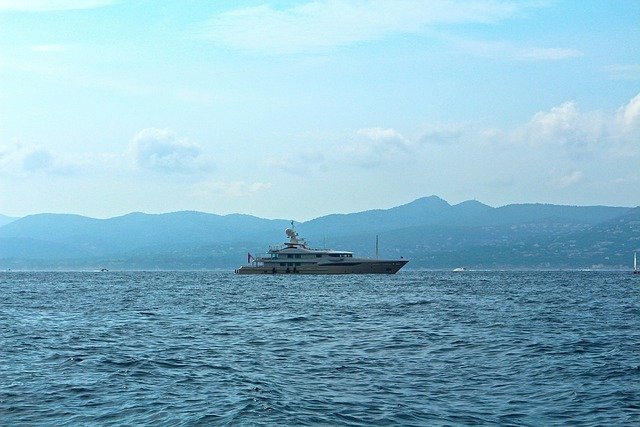Floating Hotels: The New Wave of Luxury Travel
Imagine waking up to the gentle sway of waves, stepping onto your balcony to witness an ever-changing seascape, and embarking on a journey where your accommodation is as mobile as you are. Welcome to the world of floating hotels, a burgeoning trend in luxury travel that's redefining the boundaries of hospitality and adventure. This innovative concept merges the opulence of high-end resorts with the thrill of seafaring exploration, offering travelers a unique perspective on coastal destinations and oceanic wonders.

Early prototypes of floating hotels appeared in the late 20th century, primarily as static structures in calm waters. These initial designs were often repurposed ships or barges, offering basic amenities and a novel setting for overnight stays. As engineering capabilities advanced and traveler preferences evolved, the concept of mobile floating hotels began to take shape, promising a blend of luxury, adventure, and sustainability.
Architectural Marvels on Water
Today’s floating hotels are marvels of modern engineering and architectural innovation. Unlike their predecessors, these structures are designed from the ground up (or rather, from the waterline up) to provide a seamless blend of stability, comfort, and mobility. Cutting-edge stabilization systems ensure a smooth experience even in choppy waters, while eco-friendly propulsion methods minimize environmental impact.
The design of these aquatic accommodations varies widely, from sleek, yacht-like vessels to expansive, multi-story structures that rival land-based luxury resorts. Some floating hotels boast glass-bottom floors, allowing guests to observe marine life directly from their rooms. Others feature retractable terraces that can be extended over the water, providing private sunbathing spots with unparalleled ocean views.
A New Dimension of Destination Exploration
One of the most compelling aspects of floating hotels is their ability to offer a constantly changing backdrop. Unlike traditional hotels or even cruise ships, these mobile accommodations can navigate to secluded bays, remote islands, and hard-to-reach coastal areas. This mobility allows guests to experience multiple destinations without the hassle of packing and unpacking or changing rooms.
Itineraries are often flexible, adapting to weather conditions, local events, or even guest preferences. One day, travelers might find themselves anchored near a bustling coastal town, exploring local markets and cuisine. The next, they could wake up to the serene beauty of a pristine, uninhabited island, with opportunities for snorkeling, kayaking, or beachcombing just steps from their room.
Sustainability at Sea
As the travel industry grapples with its environmental impact, floating hotels are positioning themselves as a more sustainable alternative to traditional cruise ships and coastal resorts. Many of these vessels incorporate state-of-the-art waste management systems, solar panels, and wind turbines to reduce their carbon footprint. Some even utilize cutting-edge water purification technologies that allow them to produce their own fresh water, minimizing the strain on local resources.
Moreover, the mobile nature of these hotels allows for better management of tourist impact on sensitive coastal ecosystems. By dispersing visitors across multiple locations and limiting time spent in any one area, floating hotels can help mitigate the environmental stress often associated with mass tourism in popular coastal destinations.
The Future of Aquatic Hospitality
As the concept of floating hotels gains traction, we’re likely to see further innovations in this space. Some visionaries are already exploring the possibility of submersible rooms that offer underwater views, while others are developing modular floating hotels that can be easily assembled and disassembled in different locations.
The potential for these aquatic accommodations extends beyond leisure travel. They could serve as mobile research stations for marine scientists, temporary housing solutions in coastal areas affected by natural disasters, or even as floating conference centers for international summits focused on ocean conservation and climate change.
Navigating the Waters of Floating Luxury
• Book in advance: As a niche offering, floating hotels often have limited capacity and can fill up quickly, especially during peak travel seasons.
• Pack light: Space can be at a premium on these aquatic accommodations. Consider versatile clothing options that can be dressed up or down.
• Be flexible: Weather and sea conditions can affect itineraries. Embrace the spontaneity that comes with this unique travel experience.
• Bring motion sickness remedies: Even with advanced stabilization systems, some movement is inevitable. Pack medication or natural remedies just in case.
• Research the specific hotel: Amenities and experiences can vary widely between different floating hotels. Choose one that aligns with your interests and comfort level.
As we look to the horizon of travel trends, floating hotels stand out as a beacon of innovation, offering a fresh perspective on luxury accommodations and destination exploration. By blending the allure of the open sea with the comforts of high-end hospitality, these mobile marvels are charting a new course for adventurous travelers seeking unique and immersive experiences. As technology advances and traveler preferences continue to evolve, floating hotels may well become a cornerstone of future coastal and oceanic tourism, redefining our relationship with the world’s waterways and the concept of “room with a view.”






